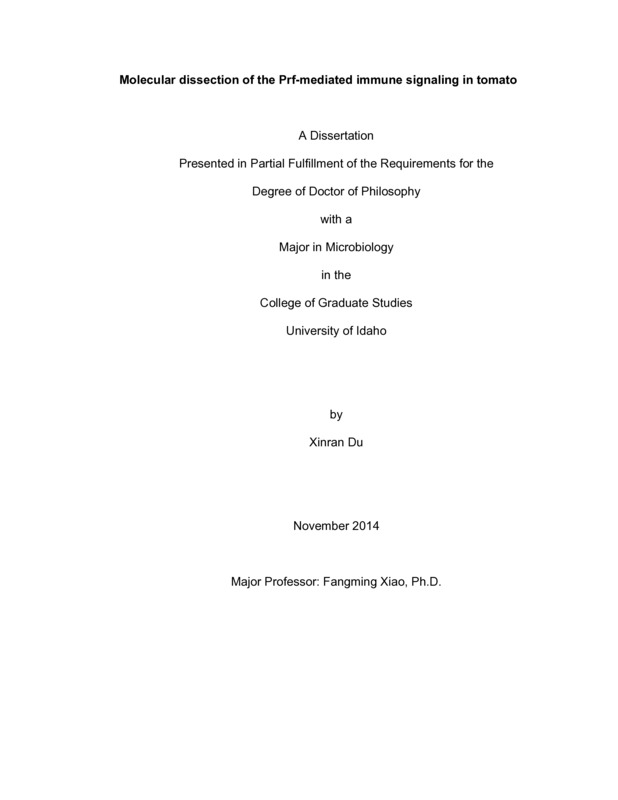Molecular dissection of Prf-mediated immune signaling in tomato
Du, Xinran. (2014). Molecular dissection of Prf-mediated immune signaling in tomato. Theses and Dissertations Collection, University of Idaho Library Digital Collections. https://www.lib.uidaho.edu/digital/etd/items/du_idaho_0089e_10458.html
- Title:
- Molecular dissection of Prf-mediated immune signaling in tomato
- Author:
- Du, Xinran
- Date:
- 2014
- Embargo Remove Date:
- 2016-11-21
- Keywords:
- Plant disease immunity
- Program:
- Biology
- Subject Category:
- Microbiology; Biochemistry; Molecular biology
- Abstract:
-
Tomato, one of the important crops for human consumption (United States Department of Agriculture, 2014), can be infected by Pseudomonas syringae pv. tomato (Pst) and develop speck symptoms on leaf, stem and fruit.
Pst utilizes the Type III secrection system (TTSS) to inject an array of effector proteins into plant cells and these effectors act collectively to trigger diseases. Among the effectors, AvrPtoB is recognized by Pto, a serine/threonine kinase, which is complexed with a NB-LRR immune receptor Prf. Even though a few components involved in the signaling pathway have bee identified, the details of signaling mechanisms remain elusive. Here we report several important findings in the dynamic intracellular events involving the Pto/Prf signaling pathway against Pst infection. The Leucine-rich repeat (LRR) domain of Prf suppresses the HR-like cell death triggered by an auto-active Prf mutant (PrfD1416V) by promoting degradation of the PrfD1416V protein. We also found that LRR also suppresses the cell death involved in the Prf immune signaling pathway versus Rpi-blb1 immune signaling pathway. Taken together, we hypothesize that the Prf LRR domain plays a negative regulatory role in the Prf-mediated immune signaling by decreasing Prf protein accumulation via an unknown mechanism.
Abnormal accumulation of immune receptors in plants frequently causes cell death. Therefore, the protein level of immune receptors has to be finely regulated. It has been shown previously that the Pst effector AvrPtoB, which acts as a functional ubiquitin E3 ligase, promotes Prf degradation in planta (Ntoukakis et al., 2009). Since no interaction between AvrPtoB and Prf has been detected in vivo, it appears that AvrPtoB may ubiquitinate Prf indirectly in plant cells. In our lab, a group of SINA (SEVEN IN ABSENTIA) ubiquitin E3 ligases have been identified that target Prf for ubiquitination and subsequent degradation. Remarkably, AvrPtoB-promoted Prf degradation is severely impaired in SINA-silenced plants, indicating the pivotal roles of SINA E3 ligases in this degradation event. Overall, our data suggests a hypothesis that AvrPtoB manipulates the host ubiquitination machinery to promote degradation of the NB-LRR immune receptor Prf thus suppressing plant immunity.
- Description:
- doctoral, Ph.D., Biology -- University of Idaho - College of Graduate Studies, 2014
- Major Professor:
- Xiao, Fangming
- Committee:
- Caplan, Allan; Hong, Zonglie; Kuhl, Joseph
- Defense Date:
- 2014
- Identifier:
- Du_idaho_0089E_10458
- Type:
- Text
- Format Original:
- Format:
- application/pdf
- Rights:
- In Copyright - Educational Use Permitted. For more information, please contact University of Idaho Library Special Collections and Archives Department at libspec@uidaho.edu.
- Standardized Rights:
- http://rightsstatements.org/vocab/InC-EDU/1.0/

